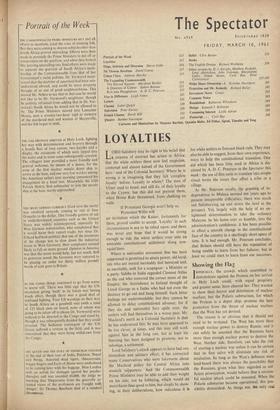— Portrait of the Week
THE COMMONWEALTH PRIME MINISTERS MEI and all efforts to maintain, amid the cries of stinking fish, that they were coming to discuss subjects other than South Africa proved unavailing. Efforts were then made to persuade the Prime Ministers to put off or compromise on the question,.and when they looked like proving unavailing too, final efforts were made to separate the question of South Africa's mem- bership of the Commonwealth from that of her Government's racial policies. Dr. Verwoerd main- tained that the doctrine of apartheid had been mis- understood abroad, and could be more properly thought of as one of good neighbourliness. This moved Mr. Nehru to say that in that case he would not like to be Dr. Verwocrd's neighbour, though he politely refrained from adding that in Dr. Ver- woerd's South Africa he would not be allowed to be. The Prime Ministers moved into Lancaster House, past a seventy-two-hour vigil in memory of the murdered men and women of Sharpeville, and the fish began to stink.
THE USS PROTEUS ARRIVED at Holy Loch, fighting her way with determination and bravery through a hostile fleet of four canoes, two kayaks and a dinghy, the occupants of which were tipped into the water and in some cases subsequently arrested. The villagers later provided a more friendly and general welcome, by means of a dance, for the crew of the first nuclear missile depot ship to arrive at the base, and one very fast worker among the American sailors next morning announced his engagement to a local lass. Meanwhile the USS Patrick Henry, first submarine to join the parent ship at the base, warily approached.
Tim WEST GERMAN CURRENCY (God save the mark) was revalued upwards, coming to rest at four D-marks to the dollar. This friendly gesture of aid to underdeveloped countries such as the United States was widely misinterpreted, especially by West German industrialists, who complained that it would harm their export trade; but since Dr. Erhard had laid publicly that one of the intentions of the change was to slow down the industrial boom in West Germany, their complaints seemed likely to fall on stony ground. Opinion in America was that the move would help, but not much. Still in generous mood, the Germans were reported to be placing an order for thirty million pounds' worth of tank guns in Britain.
IN THE CONGO things continued to go from worse to worse still. There was little sign that the UN resolution giving 'teeth' to its forces was having much effect, though there was a good deal of confused fighting. Four US warships on their way to South Africa on a goodwill visit (with a total of 125 black men on board, none of whom was going to be taken off to please Dr. Verwocrd) were ordered to be diverted to the Congo and stand by, though it was subsequently decided that they could proceed. The Sudanese contingent of the UN forces suffered a reverse in the field, and it was announced that they were being withdrawn from the Congo..
HIE QUEEN AND THE DUKE OF EDINBURGH returned at the end of their tour of India, 'Pakistan, Nepal and Persia. Assorted dead tigers, rhinoceroses, trigger-fingers and Earls of Home were understood to be coming later with the baggage. Miss Landau woU an action for damages against her psycho- therapist and was awarded £6,000. the judge re- marking that 'Departures from the generally ac- cepted views of the profession arc fraught with danger.' Sir Thomas Beecham died of a cerebral thrombosis.






































 Previous page
Previous page